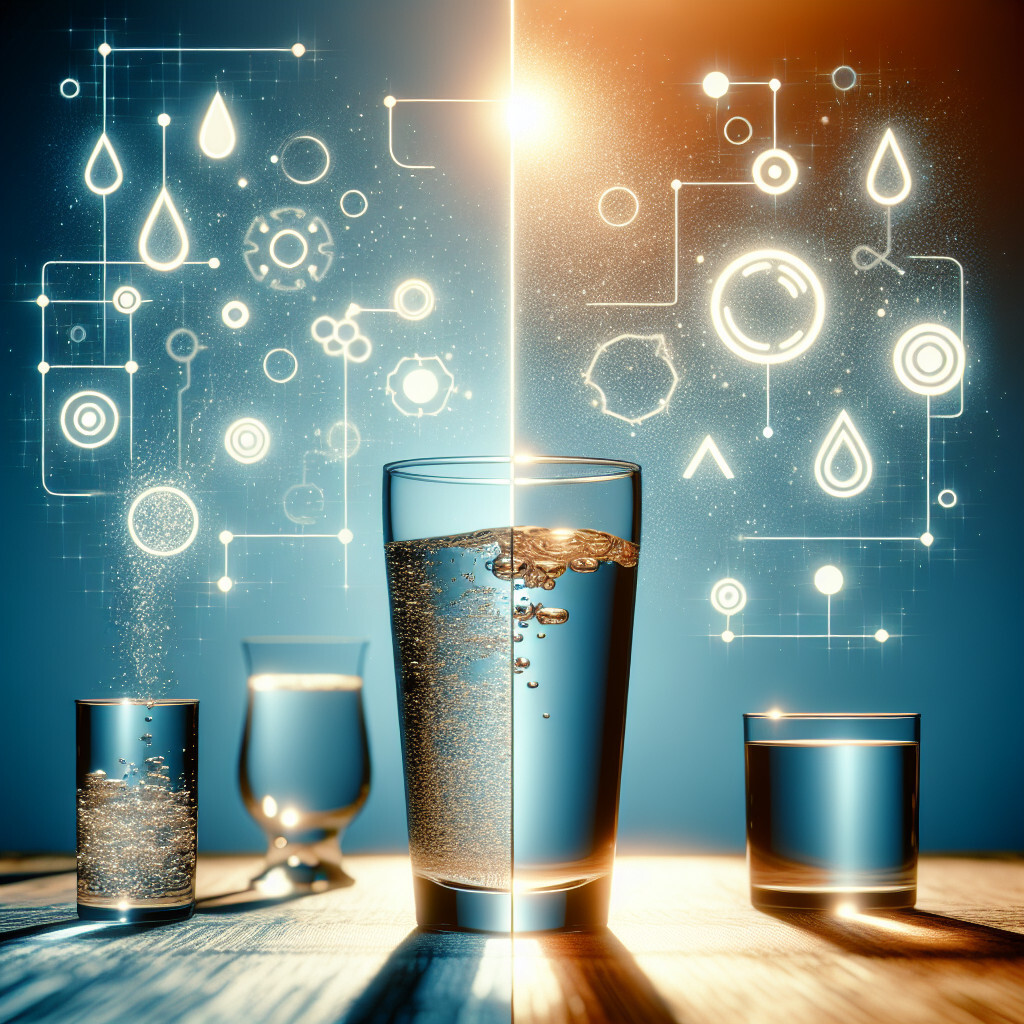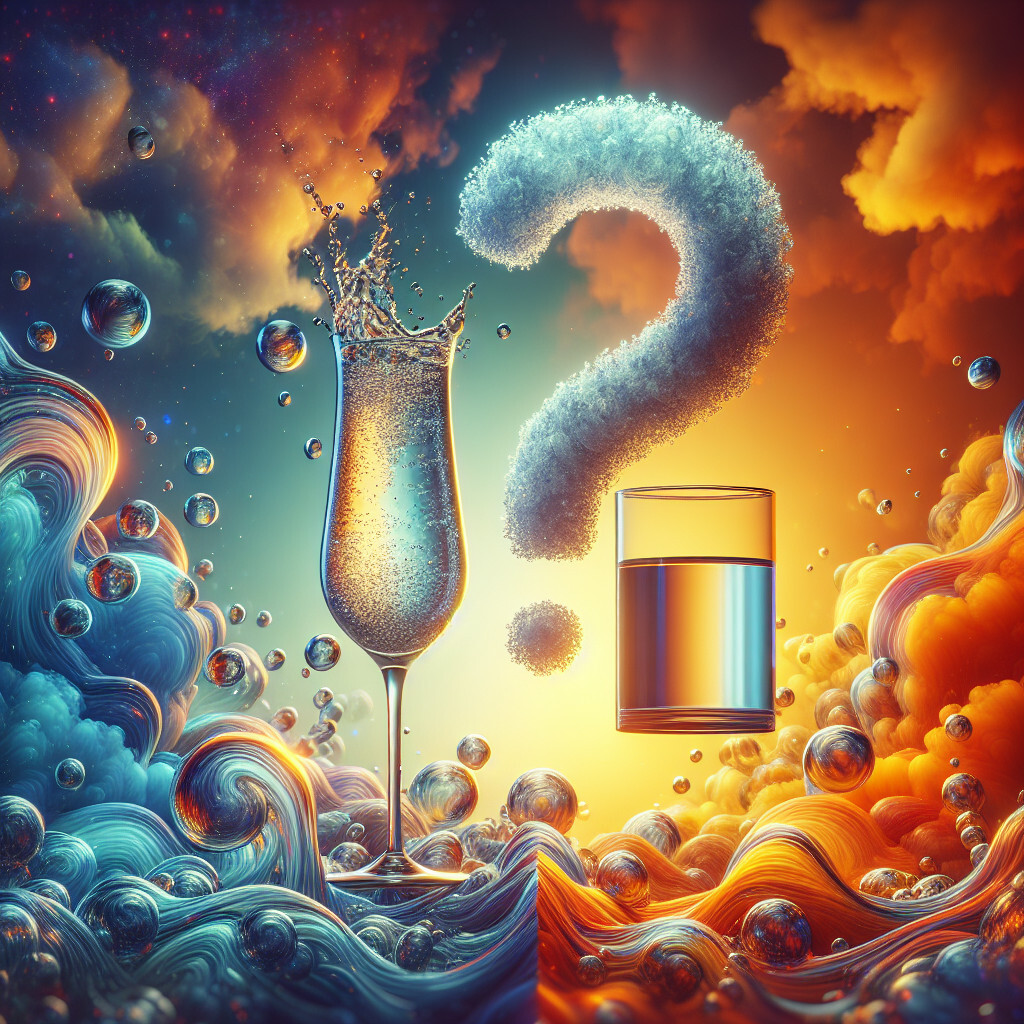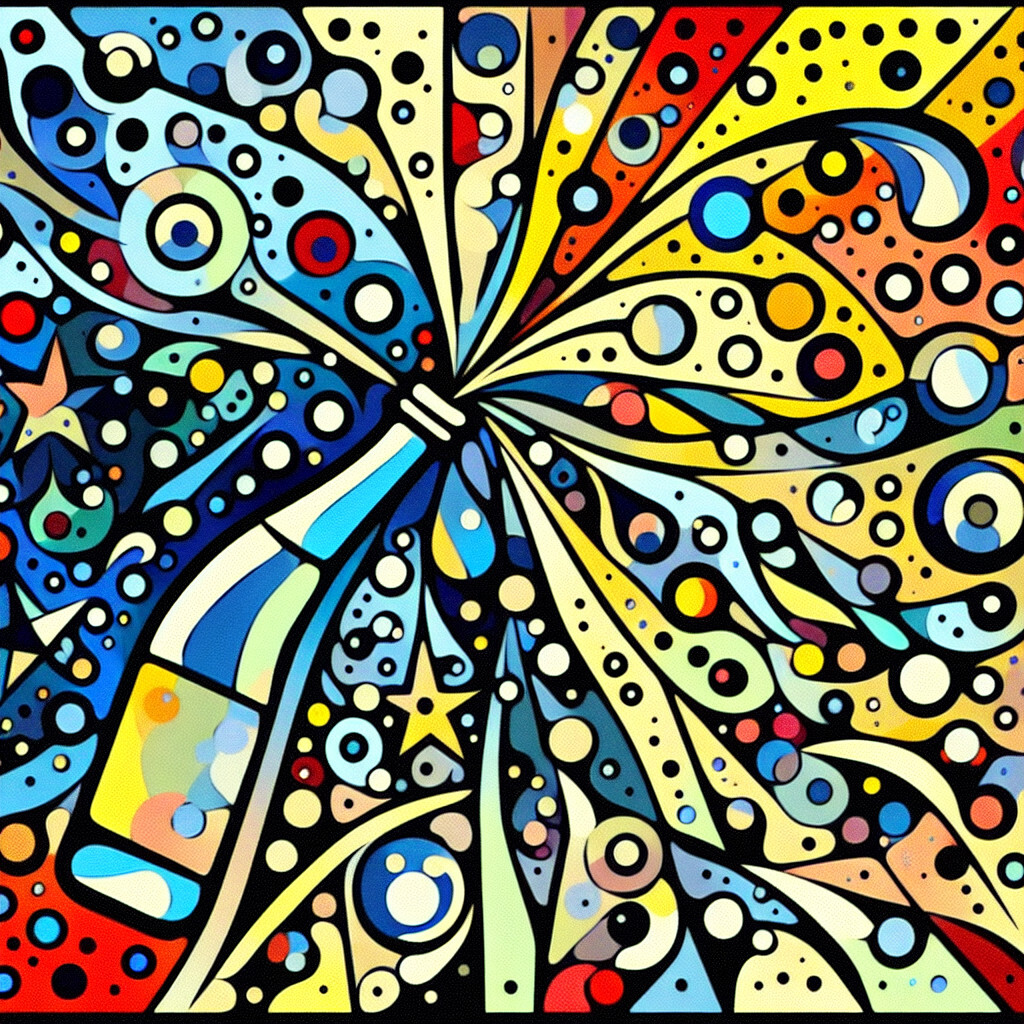-
Table of Contents
- Introduction
- Health Benefits of Replacing Regular Water with Sparkling Water
- Can Sparkling Water Truly Substitute Regular Water: A Comprehensive Analysis
- Understanding the Hydration Effects of Sparkling Water vs. Regular Water
- The Science Behind Drinking Sparkling Water Instead of Regular Water
- Q&A
- Conclusion
“Sparkling Hydration: A Fizzy Twist to Your Daily Water Intake!”
Introduction

Sparkling water is a type of carbonated water that has been infused with carbon dioxide gas under pressure. This gives it a fizzy, bubbly texture, similar to that of soda. It is a popular alternative to still water due to its refreshing taste and texture. Drinking sparkling water instead of regular water can be a suitable option for hydration, as it contains no sugars or calories. However, it’s important to choose varieties that are free from added sugars or artificial sweeteners to ensure it remains a healthy choice.
Health Benefits of Replacing Regular Water with Sparkling Water
The question of whether one can drink sparkling water instead of regular water has been a topic of interest for many health-conscious individuals. Sparkling water, also known as carbonated water, is a refreshing beverage that has gained popularity in recent years due to its unique taste and texture. But beyond its effervescence, can it serve as a viable substitute for regular water in terms of hydration and overall health benefits? The answer is a resounding yes, with a few caveats.
Firstly, it is important to note that sparkling water is fundamentally water. It is simply water into which carbon dioxide has been dissolved under pressure, creating a fizzy sensation that many find appealing. This means that, like regular water, it is calorie-free and hydrates the body. Therefore, in terms of basic hydration, sparkling water can indeed replace regular water.
Moreover, sparkling water may offer some unique health benefits. For instance, a study published in the Journal of Nutritional Science and Vitaminology found that the carbonation in sparkling water can help to suppress appetite, potentially aiding in weight loss efforts. Additionally, some research suggests that the carbonation in sparkling water can stimulate the nerves responsible for swallowing, making it potentially beneficial for individuals with dysphagia, a condition characterized by difficulty swallowing.
Furthermore, sparkling water can be a healthier alternative to sugary sodas and other sweetened beverages. It offers the same satisfying fizz without the added sugars and artificial ingredients, making it a better choice for those looking to reduce their sugar intake or maintain a healthy weight.
However, while sparkling water has its merits, it is not without its drawbacks. Some people may find that the carbonation in sparkling water can lead to bloating or gas. Additionally, flavored sparkling waters often contain added sugars or artificial sweeteners, which can negate some of the health benefits. Therefore, when choosing sparkling water, it is best to opt for varieties that are unflavored or naturally flavored without added sugars.
Another point of concern is the potential impact of sparkling water on dental health. Some studies suggest that the carbonation in sparkling water can erode tooth enamel, the protective outer layer of the teeth. However, it is worth noting that the risk is significantly lower than with sugary drinks like soda. To mitigate this risk, it is advisable to drink sparkling water in moderation and to maintain good oral hygiene practices.
In conclusion, sparkling water can serve as a viable substitute for regular water, offering hydration along with some unique health benefits. However, it is important to consume it in moderation and to choose varieties without added sugars or artificial sweeteners. As with all aspects of diet and health, balance and moderation are key. So, while you can replace regular water with sparkling water, it is best to include a variety of beverages in your diet to ensure you are meeting all of your hydration and nutritional needs.
Can Sparkling Water Truly Substitute Regular Water: A Comprehensive Analysis
The question of whether sparkling water can truly substitute regular water has been a topic of considerable debate among health enthusiasts and experts alike. This article aims to provide a comprehensive analysis of this issue, examining the potential benefits and drawbacks of replacing regular water with its sparkling counterpart.
Sparkling water, also known as carbonated water, is a popular beverage choice for many, particularly those seeking a healthier alternative to sugary sodas and juices. It is essentially water into which carbon dioxide gas has been dissolved under pressure, resulting in a fizzy drink that can be enjoyed plain or flavored. The appeal of sparkling water lies not only in its refreshing taste but also in its zero-calorie content, making it an attractive option for those watching their weight or sugar intake.
However, the question remains: can one drink sparkling water instead of regular water? To answer this, we must first understand the role of water in our bodies. Water is vital for numerous bodily functions, including digestion, nutrient absorption, and temperature regulation. It also aids in maintaining skin health and flushing out toxins from the body. Given these crucial roles, it is recommended that an average adult consume at least 2 liters of water daily.
Sparkling water, being primarily composed of water, can contribute to this daily requirement. It is hydrating and can quench thirst just as effectively as regular water. Moreover, some studies suggest that the carbonation in sparkling water may even promote feelings of fullness, potentially aiding in weight management.
However, it is important to note that not all sparkling waters are created equal. Some are laden with added sugars, artificial flavors, and other additives that can negate their health benefits. Therefore, when choosing sparkling water, it is advisable to opt for those without added sugars or artificial ingredients.
Furthermore, while sparkling water is a hydrating beverage, it should not completely replace regular water in your diet. This is because the carbonation in sparkling water can lead to bloating and gas in some individuals, particularly when consumed in large amounts. Additionally, flavored sparkling waters, even those without added sugars, can be more acidic than regular water, which could potentially harm tooth enamel over time.
In conclusion, while sparkling water can contribute to your daily hydration needs and serve as a healthier alternative to sugary drinks, it should not entirely replace regular water in your diet. It is best consumed in moderation, alongside a balanced intake of regular water. As with any dietary change, it is always advisable to consult with a healthcare professional or a registered dietitian to ensure that it aligns with your individual health needs and goals.
In essence, sparkling water can be a refreshing and enjoyable addition to your hydration routine. However, it is important to remember that it is not a magic bullet for health and should be part of a balanced diet and lifestyle. So, the next time you reach for a fizzy drink, consider swapping your soda for a glass of sparkling water – your body might just thank you for it.
Understanding the Hydration Effects of Sparkling Water vs. Regular Water
The question of whether one can drink sparkling water instead of regular water is one that has been asked by many, particularly those who enjoy the fizz and flavor of sparkling water. The answer, in short, is yes. However, understanding the hydration effects of sparkling water versus regular water is crucial to making an informed decision about your hydration habits.
Water is essential for life. It aids in digestion, helps regulate body temperature, lubricates joints, and carries nutrients and oxygen to cells. The human body is made up of about 60% water, and it’s recommended that we drink at least eight 8-ounce glasses of water per day to maintain optimal health. But does it matter if this water is sparkling or still?
Sparkling water, also known as carbonated water, is simply water into which carbon dioxide gas has been dissolved under pressure. This process, known as carbonation, is what gives sparkling water its bubbles. Some people find that the effervescence of sparkling water makes it more enjoyable to drink than its still counterpart, leading them to consume more water overall. This increased consumption can certainly contribute to meeting daily hydration needs.
However, it’s important to note that not all sparkling waters are created equal. Some contain added sugars, artificial sweeteners, or other additives that can negatively impact health. For instance, consuming too much sugar can lead to weight gain and other health problems, while artificial sweeteners can disrupt the body’s natural processes. Therefore, when choosing sparkling water, it’s best to opt for varieties that are free of these additives.
In terms of hydration, studies have shown that sparkling water hydrates just as well as regular water. A study published in the American Journal of Clinical Nutrition found no significant difference in the hydration status of participants who drank still water versus those who drank carbonated water. This suggests that sparkling water can be a viable alternative to regular water for those looking to meet their daily hydration needs.
However, there are a few caveats to consider. Some people may find that the carbonation in sparkling water can lead to feelings of bloating or fullness, which may discourage them from drinking enough to stay properly hydrated. Additionally, the acidity in sparkling water can contribute to dental erosion over time, although the risk is significantly lower than with sugary drinks like soda.
In conclusion, sparkling water can indeed be drunk instead of regular water, and can contribute to meeting daily hydration needs. However, it’s important to choose sparkling waters that are free of added sugars and artificial sweeteners, and to be aware of potential side effects like bloating and dental erosion. As with most things in life, moderation is key. If you enjoy the fizz of sparkling water, feel free to incorporate it into your hydration routine, but don’t forget about the benefits of good old-fashioned still water as well.
The Science Behind Drinking Sparkling Water Instead of Regular Water
The question of whether one can drink sparkling water instead of regular water has been a topic of interest for many health-conscious individuals. Sparkling water, also known as carbonated water, is a popular beverage choice for those who enjoy the fizzy sensation it offers. However, some people are concerned about the potential health implications of replacing regular water with sparkling water. This article aims to delve into the science behind drinking sparkling water instead of regular water.
Firstly, it is important to understand what sparkling water is. It is essentially water into which carbon dioxide gas has been dissolved under pressure, resulting in a fizzy drink. Some types of sparkling water also contain added minerals or are naturally rich in them, but it is the carbonation that sets sparkling water apart from regular water.
One of the primary concerns about drinking sparkling water is its potential effect on dental health. The carbonation process results in the formation of carbonic acid, which could potentially harm tooth enamel. However, research indicates that the effect of sparkling water on dental health is minimal, especially when compared to sugary drinks or even fruit juices. A study published in the Journal of Oral Rehabilitation found that while sparkling water is slightly more erosive than still water, it is about 100 times less erosive than soft drinks. Therefore, from a dental perspective, drinking sparkling water is far preferable to consuming sugary beverages.
Another concern is the potential impact of sparkling water on bone health. Some people fear that the carbonation in sparkling water could leach calcium from bones, leading to osteoporosis. However, this myth seems to stem from studies on cola drinks, which are associated with lower bone density, but these drinks often contain phosphoric acid, not present in sparkling water. A study published in the American Journal of Clinical Nutrition found no significant link between carbonated water consumption and decreased bone mineral density.
In terms of hydration, sparkling water has been found to be just as effective as regular water. A study published in the American Journal of Physiology concluded that there was no significant difference in the hydration status of individuals who drank carbonated water compared to those who drank still water. This means that sparkling water can be just as hydrating as regular water, making it a viable option for daily hydration needs.
However, it is worth noting that some people may experience bloating and gas from drinking sparkling water due to the release of carbon dioxide gas in the stomach. Also, flavored or sweetened sparkling waters may contain added sugars or artificial sweeteners, which could contribute to weight gain and other health problems if consumed in excess.
In conclusion, the science suggests that drinking sparkling water instead of regular water is generally safe and can be part of a healthy diet. It is just as hydrating as regular water, has minimal effects on dental health, and does not appear to negatively impact bone health. However, it is always important to read labels carefully to avoid sparkling water with added sugars or artificial sweeteners. As with all things, moderation is key, and it is also crucial to maintain a balanced diet and lifestyle.
Q&A
1. Question: Can sparkling water hydrate the body like regular water?
Answer: Yes, sparkling water can hydrate the body just as effectively as regular water.
2. Question: Is it safe to replace regular water with sparkling water?
Answer: Yes, it’s generally safe to replace regular water with sparkling water as long as it doesn’t contain added sugars or sodium.
3. Question: Can drinking sparkling water have any negative effects?
Answer: While generally safe, excessive consumption of sparkling water can lead to bloating, gas, and may potentially harm tooth enamel due to its acidity.
4. Question: Can I drink sparkling water if I am on a diet?
Answer: Yes, as long as the sparkling water doesn’t contain added sugars, it can be a calorie-free and hydrating choice for those on a diet.
Conclusion
Yes, you can drink sparkling water instead of regular water as it can keep you hydrated. However, it should not completely replace regular water in your diet due to its acidity and potential effects on dental health.





